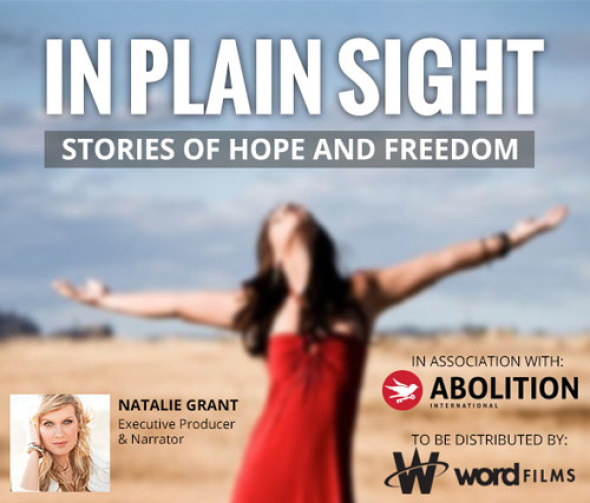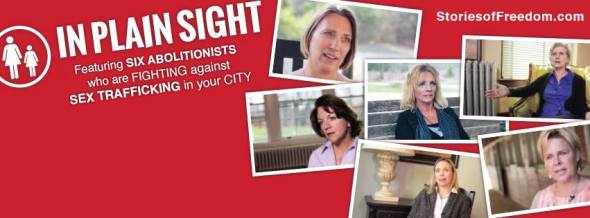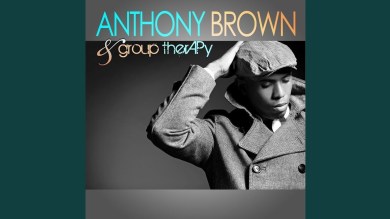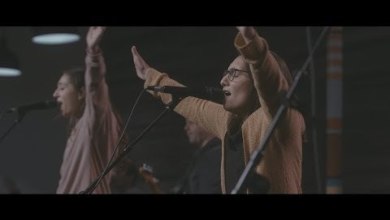Interviews|September 04, 2014 08:37 EDT
'In Plain Sight' Film Helps Expose Dark World of Sex Trafficking While Highlighting the Powerful Recovery Testimonies of Rescued Women (INTERVIEW)

BreatheCast had the opportunity to see a screening of 'In Plain Sight: Stories of Hope and Freedom', a documentary on the secret world of sex trafficking in America. We were able to speak to David Trotter, the director of the film, to learn more about what is really happening right under our noses.
After completing his documentary 'Mother India: Life Through the Eyes of the Orphan' with the help of Word Entertainment, he pitched this new film idea to them. It was there they connected him to Abolition International, an organization founded by Natalie Grant in 2005 that works to abolish sex slavery.
"They normally said no to filmmakers and the like just because of a variety of reasons, but they really resonated with the vision behind the project," Trotter said, "They began to talk about the possibility of having Natalie involved on some level because she was the founder of the organization. Through a number of conversations, they said yes and that they wanted to get behind it. Natalie ended up not only coming on board as the narrator, but also as an executive producer to get behind the project."
Trotter explained he had seen the atrocities of sex trafficking first hand while he was in India doing humanitarian work. He had also encountered it in both China and Thailand, which peeked his interest in its relation to the U.S.
"I was shocked. I couldn't believe something like that was actually happening in our country. I always thought it was people from outside our country who were being shipped and flown in and utilized in some way," he admitted, "I began to learn that it's really 80% of our U.S. citizens."
Trotter began watching documentaries on sex trafficking, and said they were "completely depressing, there is very little hope in any of the documentaries that have been produced on the topic." It was this feeling that made him wonder how to approach the subject to be educational and authentic while also bringing hope to the people watching it.
"How could we create a documentary that was full of hope that was two fold: one, through the abolitionists and two, through the lives of survivors who's lives have been transformed."
From there he spoke to Abolition International about their shelter organization and was looking to go to different cities that had been established so he could meet and speak to these people directly.
"When you create a documentary you have one idea in the beginning and then you kind of see how it will unfold. What became very clear to us after the third or fourth city is that we wanted to make this film about these six female abolitionists. These six women had become aware of the issue of sex trafficking in their mid-life and it wasn't the topic they had focuses on. This was an action they came face to face with and then took action. The story of ordinary women doing extraordinary things," Trotter said.

While focusing on these amazing care givers, he also got to meet the victims, which was something he deemed a "privilege." "Each one of these women has a unique story, although a lot of things are similar in terms of the pain they've experienced and why they are where they are. Each one has hopes and dreams..."
The director said building this relationship was hard, as it is very unusual for people to be given such close access to the women at these homes, let alone a film crew. Everyone involved opted to share their story as long as their therapist approved it for fear of re-opening old wounds and causing pain. A staff member was also present for each interview, and no minors were featured in this film.
There was only one woman in the entire film that was currently in the process of selling her body. The difference with her is that she did it herself without a pimp because she is addicted to drugs and needs money to fund her habit. Trotter said they call her "Hope" and in the documentary's first interview you can see the pain and desperation in her eyes. Hope serves as a startling early look at what some of these women have endured.
No women currently enslaved in the sex trade was featured because it would put them in danger. Also, another important thing to note is that men and boys are also trafficked. They were not shown in the documentary because Trotter was unable to locate any recovery homes that held only men.
For anyone reading this interview that is curious to the warning signs of sex trafficking, Trotter provided some details of what to look for. These tips will also be on the back of the study guide that will accompany the film.
Adult victims and child victims tend to have some differences in their cases. If they are underage they are often missing school, showing up almost hung over/drugged, physical wounds, leery of authority figures, can't go anywhere before or after school, always being watched, and have a loss of freedom. It is almost the same for adults; they are more hesitant, not enough food, and exhibit more physical and emotional issues.
"The number one thing that person needs is trust. They have learned to not trust anyone. What it is going to take for them to trust you is for them to know you are not looking to get them arrested or in trouble or put them in harm's ways. Helping them know that they are loved, cared for, and that you are trust worthy."
Most people will rarely come in contact with people who are being sex trafficked. Trotter said the people who come in the most contact with them are in the hospitality industry, transportation industry, or medical professionals. In other words, whenever they stay at a hotel, take a cab or bus, and get checked out by a doctor.
He said a doctor friend knows of two women who are trafficked. He sees their pimp drop them off at the hospital. He treats them for sexually transmitted diseases. "He's very aware of the situation and they tell him, 'Do not contact authorities. It will put our lives in danger.'" It is a very tough place to be in.
With all this information, the crew of 'In Plain Sight' wants the audience to take action. There are eight premieres happening in the Fall of 2014 which take place primarily in the places the documentary was filmed. The 31 Day Devotional Small Group and Study Guide will also be made available as well as a music CD.
All three will be out December 23, and they are aiming to have over 100 screenings in the month of January in honor of National Human Trafficking Prevention Month. The goal is educate people of trafficking in their own community, motivate them to take action and do something (which can be found in their 31 ways to take action), and use the screening to raise funds for the after care homes.
"We are trying to come alongside wonderful organizations that are already doing powerful things to combat sex trafficking in the United States. What we wanted to do was create a resource that was educational and hopeful and then motivate people to take action to not just become aware of the issue and be sad and stuck and not know what to do," Trotter said, "My hope is that church leaders and followers of Jesus will utilize these resources to rally people in their community to do something. This is happening in every community across America. This is not just in big cities, it is happening everywhere."
Trotter also wanted to note that the documentary is not necessarily faith based. They wanted to make the documentary for a broad audience, and the faith element came out through the survivors and abolitionists. Of course God was at the center of their production, and it came out naturally.
"The narrator does not at any point speak about faith or God, but yet the stories of the abolitionists and survivors share their faith openly and how God has impacted their life," he said, "We wanted anyone to bring their friend to the film and not feel like they are being converted to faith. Yet at the same time we wanted to provide followers of Jesus with a tool that would be helpful in engaging the issue beyond just the film."
He continued, "That's why we created the music album which is a filled with well known Christian artists. 100% of the proceeds will go to Abolitionist International. The study guide is for churches to use. It focuses on God's heart for the broken and vulnerable of the world and how we can participate with God in bringing hope and healing."
For more info on 'In Plain Sight', including hosting a screening and supporting the film click here.
To see some of the numbers on trafficking in the U.S. click here.
To learn more about Abolition International, click here.












